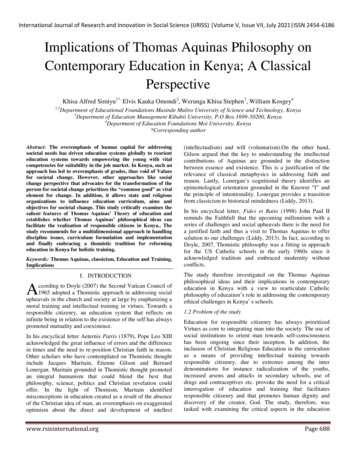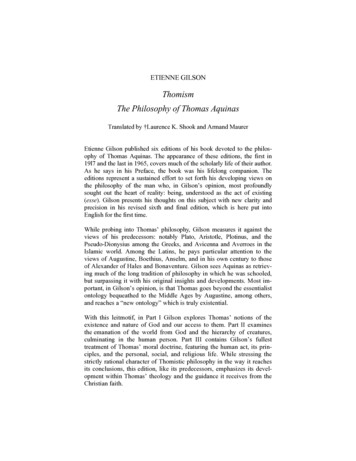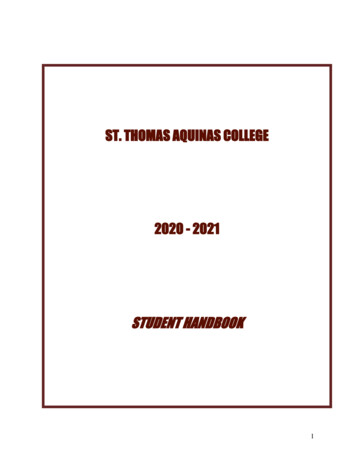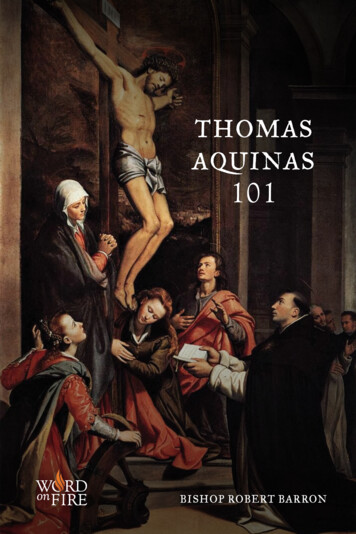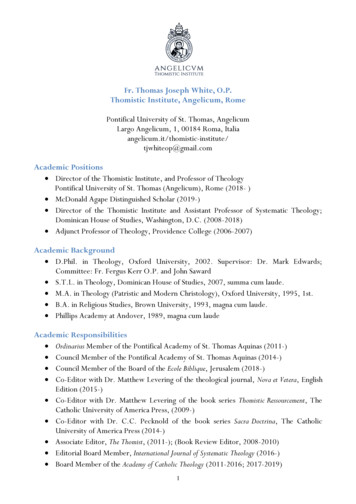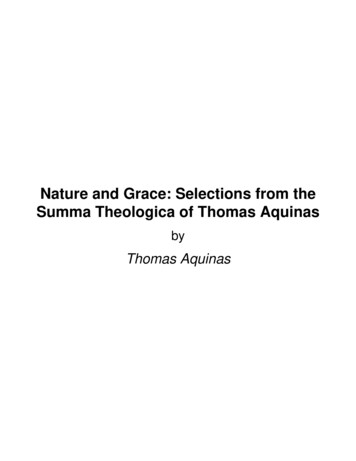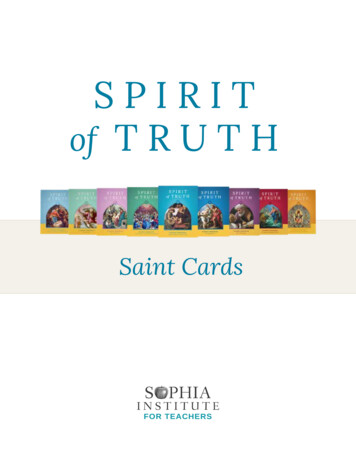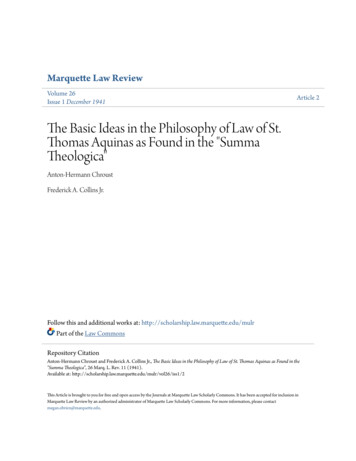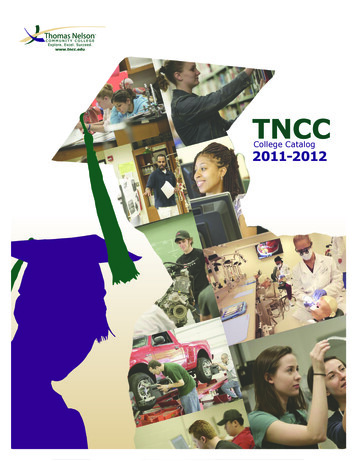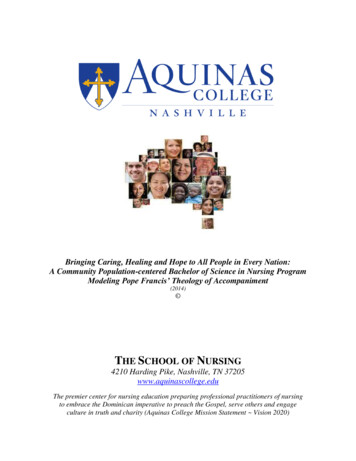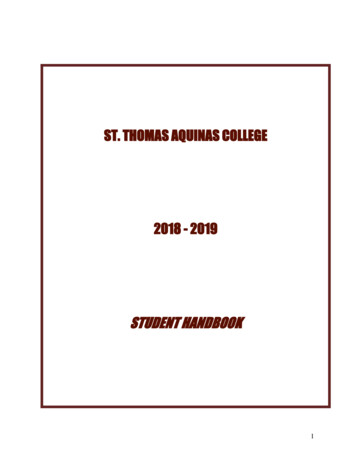
Transcription
ST. THOMAS AQUINAS COLLEGE2018 - 2019STUDENT HANDBOOK1
2018 - 2019ACADEMIC CALENDARFall Semester 2018MondayAugust 27Open RegistrationTuesdaySeptember 4Fall semester beginsTues-TuesSeptember 4-11Late RegistrationTuesdaySeptember 11Last day to add courseFridaySeptember 14Last day for 2019 grads to apply for graduationMondayOctober 8Columbus Day - HOLIDAYFridayOctober 19Mid-semester grades due to RegistrarTuesdayNovember 6Election Day - NO CLASSESWednesdayNovember 7Incomplete grades from prior semester due to RegistrarThursdayNovember 8Last day to withdraw from a courseWed-SunNov. 21 - 25Thanksgiving RecessMondayNovember 26Classes ResumeMon-FriDecember 10 - 14Last Week of Classes & ExamsFridayDecember 14Fall semester endsMondayDecember 17Final grades due online to Registrar by 11 AMWinter Interim 2019Wed-FriJanuary 2 - 19Winter Interim Session2
Spring Semester 2019ThursdayJanuary 3Open RegistrationMondayJanuary 21M.L. King Day – HOLIDAYTuesdayJanuary 22Spring semester beginsTues-TuesJanuary 22 - 29Late RegistrationTuesdayJanuary 29Last day to add a courseMon-FriMarch 11 - 15Spring BreakMondayMarch 18Classes ResumeTuesdayMarch 19Incomplete grades from prior semester due to RegistrarFridayMarch 22Mid-semester grades due to RegistrarWednesdayApril 3Last day to withdarw from a courseFridayApril 19Good Friday - HolidayMon-FriApril 29 - May 3Last Week of Classes & ExamsFridayMay 3Spring semester endsMondayMay 6Final grades due online to Registrar by 11 AMFridayMay 10Commencement – 2 PMSummer Sessions 2019Summer Session IMay 13 to June 6Summer Session IIJune 10 to June 27Summer Session IIIJuly 8 to July 183
Table of ContentsWelcome.5GENERAL INFORMATION SECTIONHistorical Information. .6College Buildings. .9Campus Resource Centers. . .11Administrative Officers andOrganizational Structure. . .14Academic Information. . .16Financial Information. . .18STUDENT DEVELOPMENT SECTIONStudent Development. . . .19Career Development .22Counseling & Psychological Services. . .23Campus Ministry & Volunteer Services. .26Department of Athletics. . .26Health Services . . . .28Campus Safety & Security. . .29Student Activities . . .40RESIDENCE LIFE SECTIONResidence Life. . .49POLICIES & PROCEDURES SECTIONGeneral Regulations on Conduct. .61Rules and RegulationsMaintenance of Order. .133Campus Telephone Directory. .1354
WELCOMEDear St. Thomas Aquinas College Student:It is with a great deal of pleasure that I welcome you to St. Thomas Aquinas College.Within these pages you will find information that will make your experience here a positive one,including important dates on the academic calendar, student activities, general resources, andgeneral information. You may also want to refer to the college website, www.stac.edu for moredetailed information on academics at the college.The Student Handbook also contains important regulations on conduct and policies. Pleasefamiliarize yourself with these policies as you will be responsible for them. Please know I havehigh expectations of you as well as for you.St. Thomas Aquinas College prides itself on providing a campus community where opportunitiesare abundant for students to learn and develop both in and out of the classroom. Becominginvolved in activities described in the “Student Development” section of the handbook willprovide you with experience in planning programs, fiscal responsibility, committee work, andpractical leadership. As you become involved with the extracurricular activities, you will developintellectually, spiritually, and socially. Most importantly, you will enjoy these experiences!Your college years at St. Thomas Aquinas will be some of the most exciting and rewardingyears of your life. I encourage you to challenge yourself while you are here. Use the handbookto set personal goals for the new academic year. If you have any questions, please stop by theRomano Student Alumni Center (RSAC) and ask any of the professionals here for YOU!Best wishes for a successful academic year!Sincerely,Dr. Margaret Mary Fitzpatrick, SCPresident5
HISTORICAL INFORMATIONSTAC HISTORYIn 1952, The Board of Regents of the State of New York granted a Provisional Charter to theDominican Sisters of Sparkill to operate a three-year elementary teacher education programunder the corporate title of St. Thomas Aquinas College. This Charter was later amended in1957 so that the College might conduct courses leading to the Bachelor of Science in EducationDegree for members of the Sparkill Congregation. In 1958, the College graduated its first classinto the ranks of the alumni - 30 strong!In 1960, the Provisional Charter was made absolute and the College was empowered to grantthe degrees of Bachelor of Arts, Bachelor of Science and Bachelor of Science in Education aswell as to admit other religious women and lay-women. In 1967, the College was granted theCharter amendment to open its doors as a coeducational institution.In 1981, the College was granted a Charter amendment to offer the associate in arts andassociate in science degrees at the United States Military Academy at West Point. The programwas designed and implemented at the Army’s request for enlisted military personnel, officers,spouses and dependents and civilian employees at the military base at West Point and theStewart Army Subpost.In 1985, the New York State Education Department authorized St. Thomas Aquinas College toconfer the Master of Science in Education on duly qualified students completing the registeredprograms and, simultaneously, approved the first graduate program in special education.Additional programs, in elementary education, in secondary education and in reading, leading tothe degree of Master of Science in Education (M.S. in Ed.) as well as a Certificate of AdvancedStudy (CAS) leading to provisional certification (PreK-6, and 7-12) were authorized in May 1992.The CAS was superseded by the MST in 2002.In 1994, the New York State Education Department authorized St. Thomas Aquinas College toconfer the Master’s of Business Administration in Business Administration, on duly qualifiedstudents completing the registered program with concentrations in finance, marketing ormanagement. Five-year dual degree programs in engineering are offered cooperatively with TheGeorge Washington University in Washington, D.C., and Manhattan College in New York City.The College also has a dual degree program in podiatry in cooperation with the New YorkCollege of Podiatric Medicine. In 1995, the College started a five-year program, and currently(since 2002) offers a seven-year program that culminates with a Doctor of Physical Therapyfrom New York Medical College. In 1996, St. Thomas signed an articulation agreement withNew York Chiropractic College which enables students to earn a B. S. in Biology from St.Thomas, and a Doctor of Chiropractic (D.C.) from NYCC.St. Thomas students can now study in a variety of countries, including England, Ireland,Hungary, Italy, France, Spain, Finland, Korea and Japan. The College assists students inarranging study abroad opportunities.In 2002 a Master of Science in Teaching (MST) leading to initial certification (Grades 1-6 or 712) was approved by New York State, and in 2006, a Master of Science in Education inEducational Leadership leading to School Building Leader certification was approved. A Master’s6
Degree in Public Administration (MPA) in Criminal Justice was approved by the New York StateEducation Department in 2017.Since 1997, the College has formed additional strategic alliances with a number of institutionsof higher education in transfer and cooperative degree programs. The following institutions inthe area have entered into transfer agreements with St. Thomas Aquinas College: SUNYRockland, SUNY Orange, SUNY Dutchess, SUNY Hudson Valley, and SUNY Nassau CommunityColleges; CUNY Queensborough Community College; and Bergen Community College.The College also has articulation agreements with the following comprehensive undergraduateand graduate degree programs: Barry University's School of Law; Catholic University ofAmerica (MA in English); Marist College (MS in Psychology); New York University's School ofSocial Work (accelerated BS/MSW on the STAC campus); Pace University (MS in Counseling);Polytechnic University (BS/MS in Biomedical Engineering); Seton Hall University (MA inCorporate and Public Relations); St. John's University (BS,BA/MLS on the STAC campus;advanced standing agreements in graduate Biology, English, History, Math & Computer Science,Sociology, Spanish and Theology/Religious Studies); and St. John's University School of Law.We now offer a total of 100 majors, minors, specializations and dual degree programs for ourstudents. Our enrollment grew 100% in just 20 years and our physical plant has grown from 23to 60 acres. These strides, as well as all of the new projects on campus, speak of PROGRESSand we are proud of it. Yet our success and progress is a reflection of those very people we aimto serve — our students.MISSIONSt. Thomas Aquinas College is an independent liberal arts college, which provides education atthe undergraduate and graduate levels for students from all traditions. In continuing its Catholicheritage and the spirit of its founders, the Dominican Sisters of Sparkill, the College iscommitted to the principle of enlightening the mind through truth, as exemplified by ThomasAquinas, and to the Classical and Judeo-Christian ideals which have contributed to thedevelopment of humanity. Accordingly, the College is dedicated to the development of eachstudent consistent with the individual’s resolve to work and ability to achieve.Consistent with its commitments, the College requires each undergraduate to attain a broadfoundation in the liberal arts and sciences. The College provides a range of undergraduatemajors and graduate programs to assist students to prepare for careers or for further educationthrough a deeper focus in a major field of study.The College creates a welcoming, caring and challenging environment for learning. Intenselystudent-centered academic activities and vigorous student-life programs are purposefullycombined to enhance the educational process and to foster intellectual, moral, social andspiritual growth.Within this environment, St. Thomas Aquinas College assists each student in the effort todevelop as an articulate and independent member of society who uses a reasoned approach toall issues, who strives to become a responsible citizen and leader in shaping the diverse worldcommunity, who lives in a manner exemplifying the principles of service, mutual respect, andindividual responsibility, and who appreciates the value of learning as a lifelong endeavor.7
VISIONBuilding On Excellence, engendered by a spirited and collegial foundation, St. Thomas AquinasCollege will be an educational institution marked by quality and access. Quality is enhancedthrough increased access that brings to the College a diversity of peoples, ideas, and lifeexperiences. Academic excellence will be the foundation for student-centered learning. Essentialresources will be directed toward the successful accomplishment of mission-related outcomesthat will make a significant positive impact on all people involved with the College.Building on academic excellence, the undergraduate experience will be enlivened through itscore courses of liberal arts and sciences. Professional education at the undergraduate andgraduate levels will be broad based and responsive to societal needs. Graduates will be criticalthinkers and effective communicators who welcome diversity and take a reasoned approach toall issues. Guided by a distinguished faculty, our students will be the leaders of tomorrow whowork collaboratively to shape a humane future.Building on quality and access, St. Thomas Aquinas College will respond to the distinctive needsof new student populations both here and abroad. All dimensions of the College will beaffected: human resources, course scheduling, delivery of programs, costs, facilities, sites,program content and student-centered services. Ongoing strategic decision-making andplanning processes will ensure efficient information flow about institutional performance andever-changing environmental factors. Strategic alliances will be formed to maximize existingresources and to offer new educational programs. Information technology provides access toinformation and the means to support new ways of learning.COLLEGE RECOGNITION AND MEMBERSHIPSt. Thomas Aquinas College is incorporated by the Legislature of the State of New York. TheCollege has an absolute Charter from the Board of Regents of the University of the State ofNew York. The College is fully accredited by the Middle States Association of Colleges andSchools, the National Council for Accreditation of Teacher Education (NCATE) programs andaccreditation for its Bachelor of Science and its Master of Business Administration degreeprograms in business through the International Assembly for Collegiate Business Education(IACBE).St. Thomas Aquinas College holds membership in the American Council on Education,Association of American Colleges, Association of Governing Boards of Universities and Colleges,American Assembly of Collegiate Schools of Business, National Association of IndependentColleges and Universities, Commission of Independent Colleges and Universities, the Council ofIndependent Colleges, Council for the Advancement and Support of Education, the AmericanAssociation of University Women. Members of the administration and faculty hold membershipin numerous associations, including the Middle States Association of Collegiate Registrars andAdmissions Officers, the National Education Association, College Art Association, AmericanAssociation of University Professors, American Chemical Society, American Association ofMathematics, American Association for the Advancement of Science, National Council ofTeachers of English, American Philosophical Association, American Psychological Association,Council of Exceptional Children, National Association of College Admissions Counselors, Societyof Professional Journalists, Association for Continuing Higher Education and other educationaland professional associations.8
STAC TRADITIONSCollege Motto - Illuminare Mentem Per Veritatem - To Enlighten the Mind through Truth.College Seal - The SUN and STAR represent the highest aspirations of the spirit of man. TheTORCH bears the light-giving FLAME, symbol of truth and knowledge which dispels thedarkness of ignorance and leads man to achieve the CROWN of wisdom. All of these symbolsare embossed on a black and white SHIELD which represents the armor which knowledgeprovides throughout life for the truly educated individual.College Color - MAROON symbolizes a maturity rich with the surging of the human life force.The GOLD of integrity surrounds the maroon. Together they speak of the quality of human life,which, ideally, St. Thomas Aquinas College prepares the individual to live.COLLEGE BUILDINGSSPELLMAN HALL, the College's first academic building, was dedicated on June 9, 1955. Itcontains, in addition to general classrooms:The Administrative Offices:* Provost and Vice President of Academic Affairs* Director of Academic Advisement* Registrar* Director of Institutional Research and Program Development* Dean, School of Arts and Sciences* Dean of Instructional and Administrative Technology* Director of Financial Aid* Dean, Academic Services, Retention and Institutional Planning* Director of Academic DevelopmentThe Broadcast Television StudioThe Bloomberg Professional LaboratoryThe Lougheed LibraryChapelInnovation CenterThe Computer & Language LaboratoriesThe Center for Academic ExcellenceLower Level:* Office of Admissions* Pathways ProgramAQUINAS HALL was opened for use in September 1965.It contains:Gymnasium w\Locker Rooms, a Training Room9
The Kraus Fitness CenterAdministrative Athletic OfficesCollege SwitchboardMail OfficeOffice of Campus Safety and SecurityMAGUIRE HALL, the College's second academic building, was completed in September 1968.It contains, in addition to general classrooms and faculty offices:Lower Level:Faculty OfficesAdjunct and Full-time Faculty LoungesFirst Floor:Sullivan TheatreSecond Floor:Painting StudioDesign LaboratoryTHE JOSEPH F. ROMANO STUDENT ALUMNI CENTER; this building on campus wascompleted in 1988. Besides dining and lounge areas, the building houses:Upper Level:Office for Student DevelopmentVice President & Dean for Student DevelopmentAssociate Dean, Student Development & Office of Residence LifeDirector of Counseling & Psychological ServicesDirector of Career DevelopmentCampus BookstoreLower Level:Director of Campus Ministry & Volunteer ServicesDirector of Student Engagement & Student CenterStudent Government AssociationThe Thoma (College Newspaper)The Thomist (College Yearbook)The Spartan GrilleLarge Screen TVPool and Ping Pong TablesBoard Game LibraryWSTK Radio StationCOSTELLO HALL opened in 2000. The building is home to two lecture classrooms, theAzarian-McCullough Art Gallery, and Forensic & Natural Sciences Labs and Classrooms.10
BORELLI HALL, opened in the Fall of 2011, is host to classrooms and administrative offices.****************The PresidentVice President of EnrollmentVice President of Institutional AdvancementVice President for Administration and TreasurerDirector, Human ResourcesDirector of Annual Giving & Alumni AffairsDirector of DevelopmentDirector of Foundations, Government & Community RelationsDirector, Campus Communications & Enrollment MarketingBusiness OfficeAdministrative OfficesDean, School of BusinessDean, School of Teacher EducationGraduate Teacher Education OfficesMaster of Business Administration OfficesFaculty OfficesTHE MCNELIS COMMONS & AQUINAS VILLAGE are the two residence life complexes,which serve as on-campus home for over 600 students. The McNelis Commons consists of sixbuildings: the Dining Hall, four residence halls, and laundry/maintenance facility. The AquinasVillage consists of four residence halls including a lounge and laundry facilities.CAMPUS RESOURCE CENTERSTHE LOUGHEED LIBRARY - The Lougheed Library is located on two levels of Spellman Hall.The library has 40,000 cataloged books, including hundreds of DVDs and a selection of musicCDs. We have close to 100 print journals, in addition to the thousands of online full-textjournals through our electronic databases. Daily newspapers are available as well.Comprehensive library information and online access to the library catalog and library databasesis available 24/7. Just go to www.stac.edu, and click on the mySTAC page at the top rightmenu. On the next page, click on the Lougheed Library listed on the left. You will find generalinformation and access to the databases on the Library home page.The library facility features a number of spaces for quiet and group study. It has AV equipmentfor in-library viewing and listening by individuals and small groups. A microform reader/printerand coin copiers are available. A bank of public access computers is found inside the entrance.Wireless connectivity is available throughout the library. No food or cell phone use is allowedanywhere in the library, including the classrooms on the lower level.Librarians offer information literacy classes where students learn to identify, find, evaluate,select, and use information in an effective and ethical manner. Librarians also provide individuallibrary instruction, reference assistance, and interlibrary loan services.11
Always feel free to askalibrarian.comLIBRARY HOURS--ACADEMIC TERMSMonday through ThursdayFridaySaturdaySunday8:00 a.m. - 11:00 p.m.8:00 a.m. - 6:00 p.m.12:00 p.m. - 7:00 p.m.1:00 p.m. - 9:00 p.m.Exam, Interim, Spring Break, and Summer hours are posted.LIBRARY PHONE NUMBERSHelp with researchHoursGeneral Information845-398-4218845-398-4223845-398-4219THE CENTER FOR ACADEMIC EXCELLENCE - The Center for Academic Excellence offerstutoring and study skills help for all STAC students in a friendly and relaxed environment. Theprimary goal of the center is to assist students in improving their academic skills in order tobecome efficient and effective learners. For information, contact the center at 845-398-4090.The Center for Academic Excellence offers the following services:* Individual and small group tutoring* Supplemental Instruction Classes* Study Groups* Supervised study halls* College skills workshops (Time Management, Test-taking, Textbook reading, etc.)The Center for Academic Excellence is located in Spellman Hall (S111):Monday through ThursdayFriday9:00 am - 8:00 pm9:00 am - 2:00 pmTHE COLLEGE BOOKSTORE - Operated by Follett Higher Education Group is located on theupper level of the Romano Student Alumni Center. Items available for sale include coursematerials, reference publications, class and residence hall, computer supplies, STAC clothing,gifts and convenience store items. Hours are posted. Go to www.stac.bkstr.com.THE MCNELIS COMMONS DINING HALL - Located in the McNelis Commons residence lifecomplex. The Dining Hall serves breakfast, lunch and dinner on weekdays and brunch anddinner on weekends for meal plan students. Any member of the college community may electto dine in the Dining Hall, (unlimited seconds!), and pay on a cash basis per meal or open aSpartan Bucks account. For further information, contact the Dining Services Office at 845-398-12
4244.THE SPARTAN GRILLE - Located on the lower level of the Romano Student Alumni Center.The Spartan Grille is open Monday through Friday and serves the entire college community.Purchases may be by cash or through a Spartan Bucks account. For more information, contactthe Dining Service Office at 845-398-4244.CAMPUS SAFETY & SECURITY OFFICE – The Campus Safety & Security office is located oncampus in Aquinas Hall. There are campus safety officers on duty 24 hours a day, seven days aweek. If you require assistance from one of the campus safety officers, call the Campus Safety& Security Department number (845-398-4080).13
ADMINISTRATIVE OFFICERS ANDORGANIZATIONAL STRUCTUREBoard of TrusteesThe legally designated authority of and for the College is its Board of Trustees. This governingbody is a self-perpetuating Board, which is composed of thirty members. Three primary areasof responsibility of the Board are ensuring the mission, institutional policy, presidential relations,and financial resources.The Major Administrative Officers Are:******The PresidentProvost and Vice President for Academic AffairsVice President of Administration and FinanceVice President for Institutional AdvancementVice President of EnrollmentVice President and Dean for Student DevelopmentThe PresidentThe President is the chief executive officer of the College and is responsible for itsadministration. It is the President's duty to see that the mission and goals of the College areattained in keeping with the directives of the Board of Trustees.Provost and Vice President for Academic AffairsThe Provost and Vice President for Academic Affairs develops, coordinates, and implements theinstructional programs of the College. The Vice President is assisted by the Dean of AcademicSupport, Retention, and Institutional Planning; Director of Academic Advisement; Deans of theSchools of Arts and Sciences, Business, and Education; Director of Institutional Research;Registrar, Director of Library and Communication Services; Directors of Special Programs; andDean of Instructional and Administrative Technology.Vice President for Administration & FinanceThe Vice President for Administration & Finance is responsible for the business and financialaffairs of the College. Reporting to this position is: The Controller, Senior Executive Director ofHuman Resources, Campus Store, Director of Construction and Facilities, Director ofInformation Technology and special Presidential projects. Reporting to this position is: TheDirector for Facilities & Construction and Associate Directors of Computer Information Services.Vice President and Dean for Student DevelopmentThe Vice President & Dean for Student Development coordinates and develops the nonacademic programs of the College including career counseling, personal counseling, careerplacement, residential living, health services, student activities, athletics, safety and security,and student discipline. The Dean is assisted by the Associate Dean, Student Development,Director of Counseling & Psychological Services, Director of Career Development, Director of14
Health Services, Director of Campus Ministry and Volunteer Services, Director of Campus Safetyand Security, Director of Student Engagement & Romano Student Alumni Center, Director ofAthletics, Coaching staff, Campus Safety and Security staff, and the Residence Life staff.Vice President for Institutional AdvancementThe Office of Institutional Advancement directs all College activities related to externalconstituencies. This includes public relations efforts and government, corporate and communityrelations, including the College’s President’s Council activities, activities of the AlumniAssociation and its Board of Directors, and any of those tasks directly related to the College'spublic image. The Director of Annual Giving & Alumni Affairs, Director of Development andDirector of Foundations, Government and Community Relations report directly to the VicePresident of Institutional Advancement.Institutional Advancement is responsible for all fundraising activities including: the Annual“HERITAGE FUND” which benefits the general funding needs of the College, all CapitalCampaigns which benefit scholarships and capital construction programs, the AnnualPresident’s Council Benefit Golf Tournament which benefits student scholarship programs, theAnnual Tribute Dinner, a black-tie gala, and the Annual Hall of Fame Dinner which honorsoutstanding Alumni and Friends of the College who have shown true societal accomplishment inkeeping with the mission of the College. In addition, all charitable and corporate foundationand federal/state grant appropriations, all College Development, Annual Giving, Alumni Affairs,Public/Corporate/Foundation/Governmental Relations are the responsibility of the Vice Presidentfor Institutional Advancement and staff.Vice President of EnrollmentThe Vice President of Enrollment’s mission is to combine all college resources to increase thenumber of new enrolled students each year in the undergraduate and graduate programs at thecollege while staying within the budget parameters set by the President of the College. TheDirector of Admissions, Director of Financial Aid, and the Director for Enrollment Marketing andCampus Communications report directly to the Vice President. The Vice President works withthe directors of the graduate programs, the Honors Program, the Pathways Program, the WestPoint Program, the High School Programs and the HEOP Program to develop and executeenrollment goals for these programs.15
ACADEMIC INFORMATIONThe St. Thomas Aquinas College Undergraduate and Graduate Catalogs, published annually(visit www.stac.edu), supply detailed information on degree requirements as well asprocedures and regulations regarding grading, academic honors, probation, withdrawing from aclass, etc. Students should consult the Catalog when questions regarding academic mattersarise.The Academic CommunityAll members of the academic community possess rights and powers proper to their positions.The community should meet the needs of each of its members within the overall context of thegoals of the institution and of society.Attendance PolicyRegular and prompt attendance is required. Each professor for each course specifies penaltiesfor excessive absence.Grade Appeal PolicyThe following procedures are in practice for students who wish to appeal a grade:A student who feels he/she has been unfairly graded may appeal the grade within 60 days ofthe end of the semester in which the grade was earned. He/she shall first consult the instructorfor an explanation of the grade. If the student is not satisfied at this level, he/she may consultthe appropriate Dean of the School where the course is housed who - after consultation withthe instructor - may or may not recommend that the grade be changed. If the student remainsdissatisfied, he/she may submit the appeal in writing to the Provost & Vice President forAcademic Affairs. Having received the written complaint, the Provost & Vice President forAcademic Affairs shall forward a copy of it to the faculty member and ask the faculty member torespond in writing. The Provost & Vice President for Academic Affairs, after consulting with theDean, may or may not direct that the grade be changed and will communicate the decision inwriting to the student.Incomplete GradesAn Incomplete grade indicates that a student has completed the majority of the assignedcoursework, but due to some extraordina
of higher education in transfer and cooperative degree programs. The following institutions in the area have entered into transfer agreements with St. Thomas Aquinas College: SUNY Rockland, SUNY Orange, SUNY Dutchess, SUNY Hudson Valley, and SUNY Nassau Community Colleges; CUNY Queensborough Community College; and Bergen Community College.
